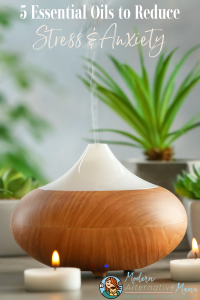By Sarena-Rae Santos, Natural Health Blogger
An estimated 31.1 percent of Americans experience anxiety disorders at some time in their lives (1). Additionally, nearly 2 in 3 adults (65%) find the current uncertainty in our nation causes them stress (2). Anxiety and stress often go hand in hand. Whether you deal with stress and anxiety daily or once in a while, there’s nothing wrong with learning natural ways to reduce stress and anxiety through herbs and essential oils.
But first, what happens to your body when you struggle with stress?
When the body is stressed, the sympathetic nervous system (SNS) contributes to what is known as the “fight or flight” response (3). The fight, flight, or freeze response is an evolved survival mechanism that protects us from perceived threats (4). Unfortunately, the body can also overreact to everyday stressors, resulting in many of us being stuck in fight-or-flight mode.
Aside from everyday stressors, we sometimes deal with particularly high-stress situations, such as the death of a loved one, long-term emotional abuse, chronic illness, or job loss. The variety of stressors can keep our cortisol levels up all day long, resulting in difficulties calming down after high-stress situations, becoming easily stressed, or even more prone to anxiety.
So what can we do to support our body and reduce stress and anxiety?
That’s where essential oils come into play, and so many can relieve stress and anxiety.
Essential Oils to Reduce Stress & Anxiety
Before we dive into essential oils to reduce stress and anxiety, let’s discuss How to Safely Use Essential Oils.
Remember, although essential oils are natural, they are also highly concentrated and can have substantial impacts. Naturopathic Pediatrics states that one drop of essential oil is equivalent to 15-40 cups of medicinal tea or up to 10 teaspoons of a tincture (5).
That’s why it’s important to practice essential oil safety when using essential oils. As usual, never use essential oils internally or undiluted (6). When using essential oils with children or those with sensitive skin, I personally recommend either diffusing or diluting essential oils in a mild carrier oil.
Now, let’s discuss my favorite stress and anxiety-reducing essential oils.
Chamomile
German Chamomile Essential Oil and Roman Chamomile Essential Oil have powerful anti-inflammatory properties, which possess many benefits. One study found that 58.1 percent of participants experienced reduced moderate to severe generalized anxiety disorder symptoms when using chamomile extract after eight weeks (7). When diffused, this essential oil is widely known for promoting emotions of serenity, which also may be helpful to children who have problems focusing.
Trusted aromatherapist Wendy Robbins doesn’t indicate any special precautions when using Roman Chamomile Essential Oil (8) and caution that a drug interaction may occur if using drugs metabolized by CYP2D6 with German Chamomile Essential Oil (9). Roman and German Chamomile Essential Oils may cause dermatitis in some, so I recommend a topical dilution of 1-3% for ultimate essential oil safety. Finally, both Roman and German Essential oils are safe for children and while pregnant and breastfeeding.
Clary Sage
Clary Sage Essential Oil is widely used for topical, respiratory, digestive, emotional, and feminine issues. One study found clary sage effective at decreasing cortisol levels and produced an antidepressant-like effect for menopausal women when inhaled (10).
Trusted aromatherapist Wendy Robbins doesn’t note any hazards for steam-distilled Clary Sage, but she recommends a dermal maximum of 0.25% (11). Clary Sage essential oil is safe for kids, breastfeeding, dogs, and horses but unsafe during pregnancy.
Lavender
Lavender Essential Oil is most commonly used for its sedative-like effect. One study found that lavender oil was equivalent to lorazepam in its starting dose in patients with subsyndromal anxiety (12). Additionally, the inhalation of lavender oil has been found to influence vital signs and anxiety (13).
Trusted aromatherapist Wendy Robbins doesn’t indicate any special precautions when using Lavender Essential Oil (14). Still, we would recommend a topical dilution of 2-5% for ultimate essential oil safety. Finally, lavender essential oil is safe for kids, pregnancy, breastfeeding, dogs, and horses.
Have you heard rumors surrounding lavender being unsafe for pre-pubertal boys? Check out our Lavender Herbal Profile to learn the truth.
Lemon
Lemon Essential Oil is commonly known for its antimicrobial and antifungal properties that are often used for cleaning, but it’s also great for energizing and uplifting your mood. Animal studies have found lemon essential oil positively affects dopamine activities in mice (15). Human studies have found that lemon essential oil significantly enhanced students’ attention level, concentration, cognitive performance, and mood during the learning process (16).
Trusted aromatherapist Wendy Robbins cautions that cold-pressed lemon essential oil is phototoxic while steam-distilled is not. A dermal maximum of 2% for the cold-pressed lemon essential oil is recommended to avoid the risk of a phototoxic reaction. Additionally, topical use of oxidized lemon essential oil is cautioned against regardless of the distillation method (17). Lemon essential oil is safe for kids, pregnancy, breastfeeding, dogs, and horses.
Sandalwood
Australian Sandalwood Essential Oil and Indian Sandalwood Essential Oil have been used in spiritual practices for thousands of years and are considered sacred. Sandalwood is best known for promoting a calm, relaxing atmosphere and helping balance the skin. One study found sandalwood essential oil effectively reduced anxiety among participants (18).
Trusted aromatherapist Wendy Robbins cautions that although rare, sandalwood essential oil has the potential to cause adverse skin reactions, and a dermal maximum of 2% is recommended (19). Australian Sandalwood is safe for kids, while Indian Sandalwood is safe for kids, pregnancy, breastfeeding, dogs, and horses.
Disclaimer: This post is not intended as medical advice. These statements have not been evaluated by the FDA, and nothing in this post is intended to diagnose, treat, or cure anything. If you have questions, please do your own research or seek advice from a health professional.


